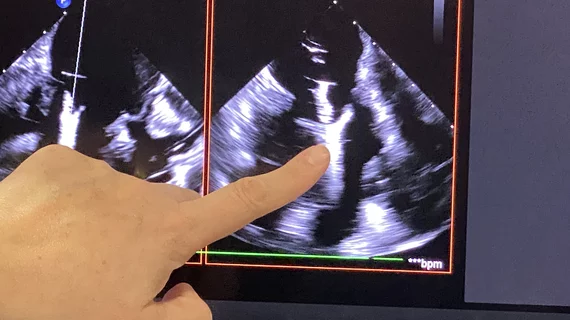Cardiology societies push Medicare to pay for tricuspid TEER
Six multispecialty cardiovascular societies have called on the Centers for Medicare and Medicaid Services (CMS) to approve payments for tricuspid transcatheter edge-to-edge repair (T-TEER) for the treatment of tricuspid valve regurgitation (TR).
The American Association for Thoracic Surgery (AATS), American College of Cardiology (ACC), American Society of Echocardiography (ASE), Heart Rhythm Society (HRS), Society for Cardiovascular Angiography and Interventions (SCAI) and Society of Thoracic Surgeons (STS) all signed on to a 13-page letter to CMS outlining why T-TEER should be reimbursed.
Earlier this year, the U.S. Food and Drug Administration cleared the Abbott TriClip for the treatment of TR. Abbott formally requested CMS develop a national coverage determination (NCD) for T-TEER. CMS initiated a National Coverage Analysis (NCA) process Oct. 3. This included a 30-day comment period, in which the multispeciality letter was included.
The letter included clinical studies and other scientific information to inform their decisions regarding the creation of a NCD. CMS will now consider the available clinical evidence on treating TR with T-TEER. CMS said it will release a proposed decision memo by April 3, 2025.
"The societies are supportive of the development of a National Coverage Determination (NCD) for T-TEER," the presidents of each society wrote in letter. "T-TEER represents an emerging technology to treat severe TR. Candidates for this technology have tricuspid valve disease severe enough to cause symptoms, despite optimal medical therapy and are at intermediate or greater risk for TV surgery. The TriClip device is currently the sole T-TEER device approved by the U.S. Food and Drug Administration (FDA)."
The letter goes on to outline the importance, role and composition of an ideal T-TEER multidisciplinary heart team, factors when determining patient selection, patient evaluation, and requirements for T-TEER programs. The societies also proposed the development of a STS/ACC T-TEER registry to monitor outcomes data. This would be a supplement the existing Trancatheter Valve Therapies (TVT) registry for TAVR and mitral valve TEER.
Additional supporting evidence for T-TEER
The TriClip was cleared by the FDA using data from the first 350 patients in the TRILUMINATE IDE trial. While that data did not show superior efficacy for T-TEER compared to optimal medical therapy, it did show large enough improvements in patient quality of life that experts felt the therapy had merit. However, new data showing efficacy will likely help change the narrative for T-TEER.
Just a couple days before the multi-society letter was sent to CMS, new data data presented at the Transcatheter Cardiovascular Therapeutics (TCT) 2024 meeting confirmed efficacy for the first time in new TRILUMINATE data that included all 570 patients in the trial.
“In the expanded cohort, all three primary efficacy endpoints for hospitalization, heart failure, mortality, and need for tricuspid surgery, showed improvement. This is significant because, previously, two out of the three outcomes had shown equivalency,” explained Gilbert H. Tang, MD, professor in the department of cardiovascular surgery at the Icahn School of Medicine and surgical director of the Structural Heart Program at the Mount Sinai Health System, who presented the findings and spoke to Cardiovascular Business in an interview.

